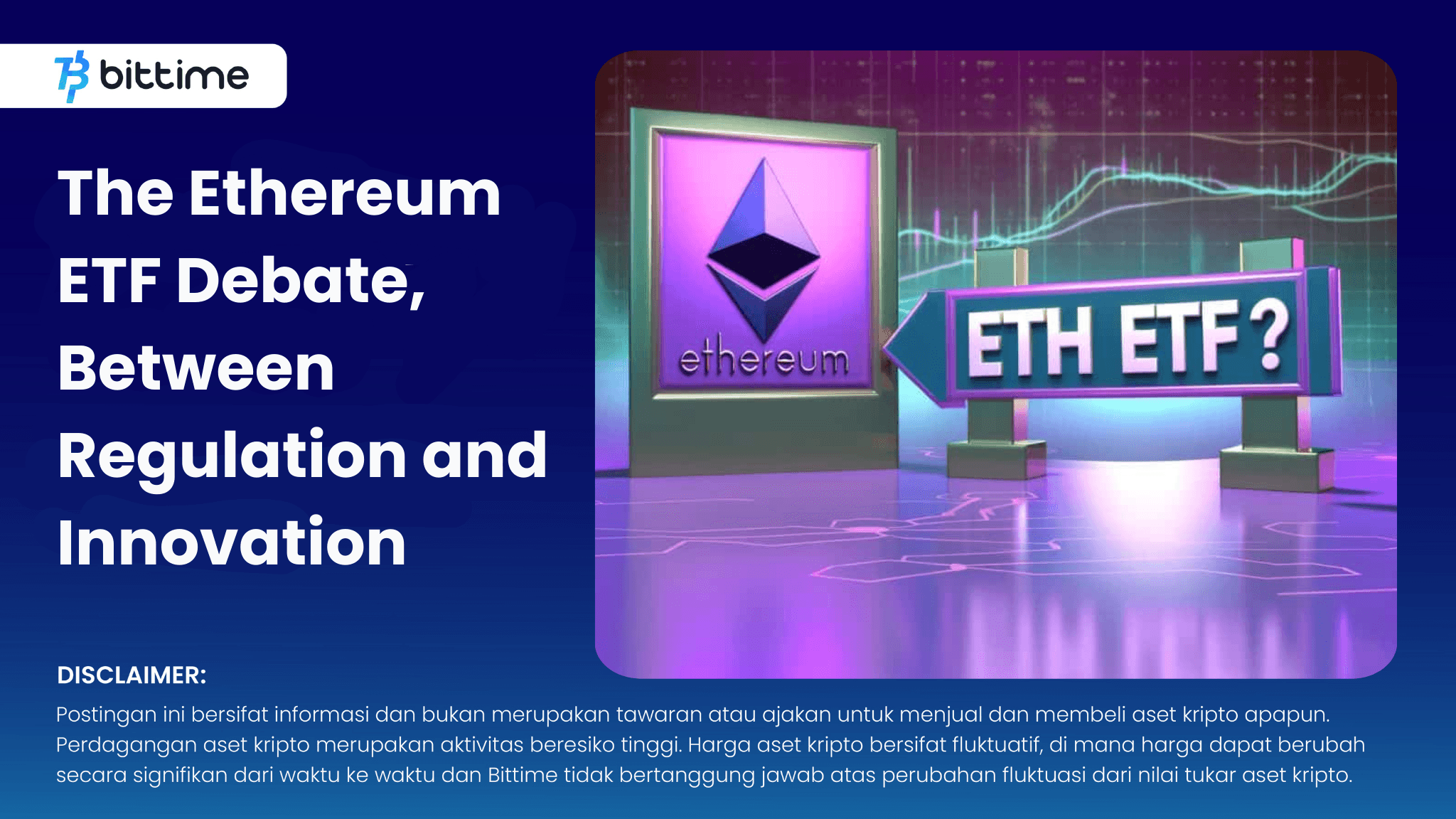The Ethereum ETF Debate, Between Regulation and Innovation
2024-06-08
Bittime - The approval of an Ethereum ETF in the United States sparked continued debate about the classification of Ethereum itself.
The SEC (Securities and Exchange Commission) has not yet definitively stated whether Ethereum falls into the securities category, raising significant implications for regulation and innovation.
Dilemmas of Classification as Securities
The crux of the debate lies in control. Securities represent ownership in a company, and investors have certain rights and expectations regarding that ownership. If the SEC deems Ethereum a security, it will come under stricter regulation to protect investors from fraud and manipulation.
Proponents of classifying Ethereum as a security argue that its underlying technology is similar to a security. They exemplify the Ethereum Foundation's role in its ongoing development and maintenance, demonstrating a centralized control structure consistent with securities classification.
However, opponents emphasize the decentralized nature of the Ethereum network. They argue that Ethereum operates more like a public utility, facilitating transactions and supporting a large ecosystem of decentralized applications (dApps) without a central authority.
Ethereum ETF Approval: An Unexpected Plot Twist
The story of Ethereum, the second largest cryptocurrency by market capitalization, changed drastically with the SEC's approval of a physical Ether ETF (Exchange Traded Funds). This unexpected move adds to the debate over regulation and crypto adoption in general, with far-reaching consequences for the Ethereum ecosystem and the broader crypto market.
Support for Ethereum Adoption
The approval of an Ethereum ETF removes a significant barrier for mainstream investors. Previously, gaining exposure to Ethereum required using a crypto exchange, which potentially raised concerns about security and complexity.
ETFs, familiar investment instruments traded on traditional stock exchanges, offer a more accessible and potentially safer way for investors to participate in the Ethereum market.
This increased accessibility will likely drive a surge in interest from institutional and retail investors, potentially leading to a significant increase in Ethereum's price and market liquidity.
The SEC's approval signals regulatory acceptance of Ethereum, potentially allaying concerns about its legitimacy and long-term viability. This validation could increase investor confidence and encourage broader institutional adoption of Ethereum and other cryptocurrencies.
Catalyst for Innovation and Ecosystem Growth
Availability Ethereum ETFs could open new capital flows for the rapidly growing DeFi ecosystem. Investors looking to gain exposure to DeFi applications built on the Ethereum blockchain can now do so indirectly through ETFs, potentially accelerating the development and adoption of DeFi protocols.
The influx of capital and mainstream attention sparked by the ETF approval could drive further innovation in the Ethereum ecosystem. Developers will be encouraged to overcome existing scalability challenges and explore solutions such as Ethereum 2.0 (Eth2), which promises faster transaction processing and lower fees.
New Challenges and Considerations
Potential for Market Manipulation: Critics argue that the introduction of an Ethereum ETF could make the market more susceptible to manipulation by large institutional investors. The SEC needs to closely monitor trading activity and implement safeguards to ensure fair and transparent markets.
Investors should be aware that the performance of an Ethereum ETF may not fully reflect the price of Ether itself, leading to tracking error. Additionally, the fundamental risks associated with the cryptocurrency market, such as volatility and security breaches, still apply to investors holding ETF shares.
Ripple Effects on the Wider Crypto Market
The SEC's approval of an Ethereum ETF could pave the way for the approval of similar ETFs for other cryptocurrencies in the future. This could trigger a domino effect, leading to wider mainstream adoption of the entire crypto asset class.
The emergence of cryptocurrency ETFs could increase competition between traditional assets and cryptocurrencies. Investors seeking diversification and high returns can allocate a portion of their portfolio to crypto ETFs, potentially impacting allocation patterns for traditional asset classes.
A Turning Point for the Crypto Landscape: Regulation and Innovation Coexist
The SEC's approval of an Ethereum ETF is a watershed moment for the cryptocurrency industry. This signals increasing regulatory acceptance, opens the door to mainstream investor participation, and has the potential to drive innovation in the Ethereum ecosystem.
However, challenges remain in terms of market manipulation, underlying asset risks, and broader implications for traditional asset classes.
Nonetheless, the approval of an Ethereum ETF marks a significant step towards mainstream adoption of the cryptocurrency and could reshape the financial landscape in the years to come. As markets evolve and regulations adapt, one thing is certain: the story of Ethereum, and the broader crypto space, is far from over.
String Pulling: Regulation and Innovation Post Approval of Ethereum ETFs by the SEC
The SEC's decision to approve an Ethereum ETF marks a turning point for the cryptocurrency industry. This decision again highlights the complicated relationship between regulation and innovation, a constant theme in the crypto space.
While this approval signals a step towards mainstream adoption, it also raises important questions about how to navigate this complex relationship in the post-Ethereum ETF era.
Catalyst for Innovation
The accessibility and security offered by an Ethereum ETF can attract new capital and talent to the Ethereum ecosystem. This influx of capital can drive innovation in areas such as Decentralized Finance (DeFi), which will drive the development of new applications and protocols.
With increasing mainstream interest, the focus on regulatory compliance will likely increase. Developers will likely allocate more resources to ensure their projects comply with evolving regulations, potentially leading to changes in innovation priorities.
Regulatory clarity around Ethereum ETFs could encourage exploration of permissioned blockchains, which operate under a defined regulatory framework. This may attract institutions looking for a more compliant environment in which to innovate.
Regulatory Clarity Challenges
SEC approval of an Ethereum ETF does not necessarily mean automatic approval for other cryptocurrencies. Regulatory uncertainty surrounding other crypto assets may continue to hinder innovation in the area.
The rapid pace of innovation in the crypto space may outpace regulators' ability to develop appropriate frameworks. Finding a balance between encouraging innovation and ensuring adequate oversight remains a challenge.
Regulations that are too strict can stifle innovation and hinder the development of potentially groundbreaking technology. Striking the right balance between protecting investors and encouraging progress will be critical.
The Importance of Collaboration
Regular communication between regulators and industry players will be important to navigate the evolving regulatory landscape. This encourages the creation of a collaborative environment where both parties can share insights and develop effective solutions.
Industry can demonstrate its commitment to responsible growth by establishing a strong self-regulatory framework. This includes implementing best practices, promoting transparency, and collaborating with regulators to address potential risks.
Regulatory frameworks need to be able to adapt and respond to the ever-changing nature of the crypto space. Regulators should be open to considering new approaches and revising existing regulations as necessary to encourage responsible innovation.
A New Chapter for Crypto Regulation
The approval of an Ethereum ETF by the SEC marks a step towards a more regulated and accessible cryptocurrency market. However, the push-pull relationship between regulation and innovation continues.
By encouraging open communication, prioritizing collaboration, and adopting an adaptable regulatory framework, both regulators and the industry can ensure that innovation thrives in a responsible and sustainable crypto ecosystem.
The future of cryptocurrencies depends on these collaborative efforts, and their success will determine crypto's role in shaping the ever-evolving financial landscape.
How to Buy Crypto on Bittime
You can buy and sell crypto assets in an easy and safe way via over. Bittime is one of the best crypto applications in Indonesia which is officially registered with Bappebti.
To be able to buy crypto assets at over, make sure you have registered and completed identity verification. Apart from that, also make sure that you have sufficient balance by depositing some funds into your wallet.
For your information, the minimum purchase of assets on Bittime is IDR 10,000. After that, you can purchase crypto assets in the application.
Study Complete Guide How to Buy Crypto on Bittime.
Monitor graphic movement Bitcoin (BTC), Ethereum (ETH), Solana (SOL) and other cryptos to find out today's crypto market trends in real-time on Bittime.
Disclaimer: The views expressed belong exclusively to the author and do not reflect the views of this platform. This platform and its affiliates disclaim any responsibility for the accuracy or suitability of the information provided. It is for informational purposes only and not intended as financial or investment advice.


